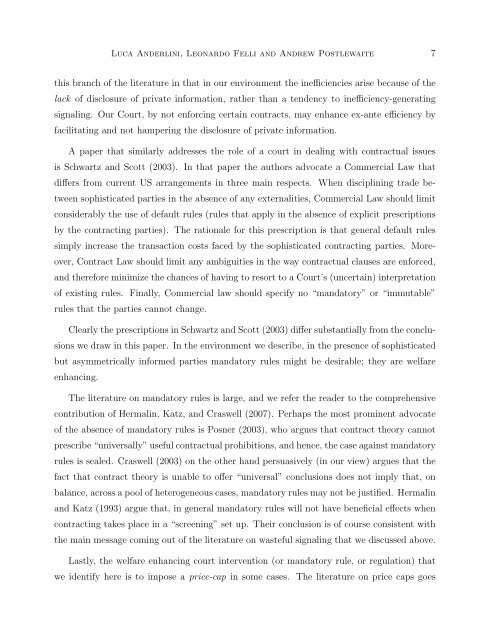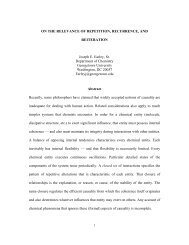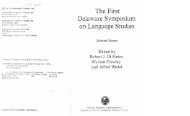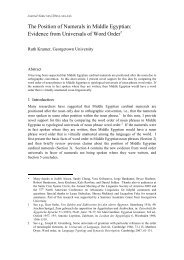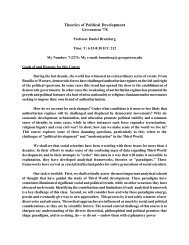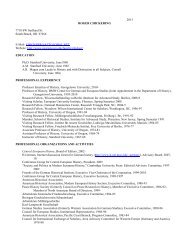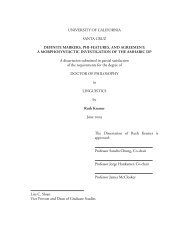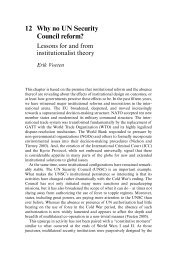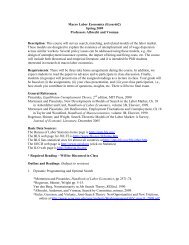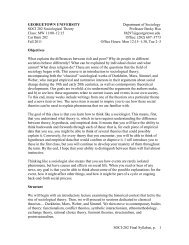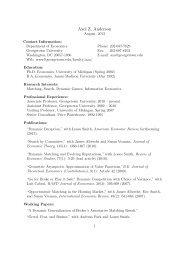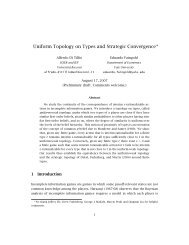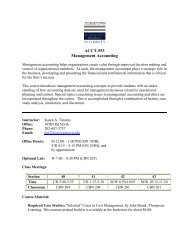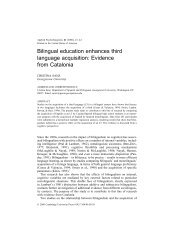PDF File - Georgetown University
PDF File - Georgetown University
PDF File - Georgetown University
Create successful ePaper yourself
Turn your PDF publications into a flip-book with our unique Google optimized e-Paper software.
Luca Anderlini, Leonardo Felli and Andrew Postlewaite 7this branch of the literature in that in our environment the inefficiencies arise because of thelack of disclosure of private information, rather than a tendency to inefficiency-generatingsignaling. Our Court, by not enforcing certain contracts, may enhance ex-ante efficiency byfacilitating and not hampering the disclosure of private information.A paper that similarly addresses the role of a court in dealing with contractual issuesis Schwartz and Scott (2003). In that paper the authors advocate a Commercial Law thatdiffers from current US arrangements in three main respects. When disciplining trade betweensophisticated parties in the absence of any externalities, Commercial Law should limitconsiderably the use of default rules (rules that apply in the absence of explicit prescriptionsby the contracting parties). The rationale for this prescription is that general default rulessimply increase the transaction costs faced by the sophisticated contracting parties. Moreover,Contract Law should limit any ambiguities in the way contractual clauses are enforced,and therefore minimize the chances of having to resort to a Court’s (uncertain) interpretationof existing rules. Finally, Commercial law should specify no “mandatory” or “immutable”rules that the parties cannot change.Clearly the prescriptions in Schwartz and Scott (2003) differ substantially from the conclusionswe draw in this paper. In the environment we describe, in the presence of sophisticatedbut asymmetrically informed parties mandatory rules might be desirable; they are welfareenhancing.The literature on mandatory rules is large, and we refer the reader to the comprehensivecontribution of Hermalin, Katz, and Craswell (2007). Perhaps the most prominent advocateof the absence of mandatory rules is Posner (2003), who argues that contract theory cannotprescribe “universally” useful contractual prohibitions, and hence, the case against mandatoryrules is sealed. Craswell (2003) on the other hand persuasively (in our view) argues that thefact that contract theory is unable to offer “universal” conclusions does not imply that, onbalance, across a pool of heterogeneous cases, mandatory rules may not be justified. Hermalinand Katz (1993) argue that, in general mandatory rules will not have beneficial effects whencontracting takes place in a “screening” set up. Their conclusion is of course consistent withthe main message coming out of the literature on wasteful signaling that we discussed above.Lastly, the welfare enhancing court intervention (or mandatory rule, or regulation) thatwe identify here is to impose a price-cap in some cases. The literature on price caps goes


